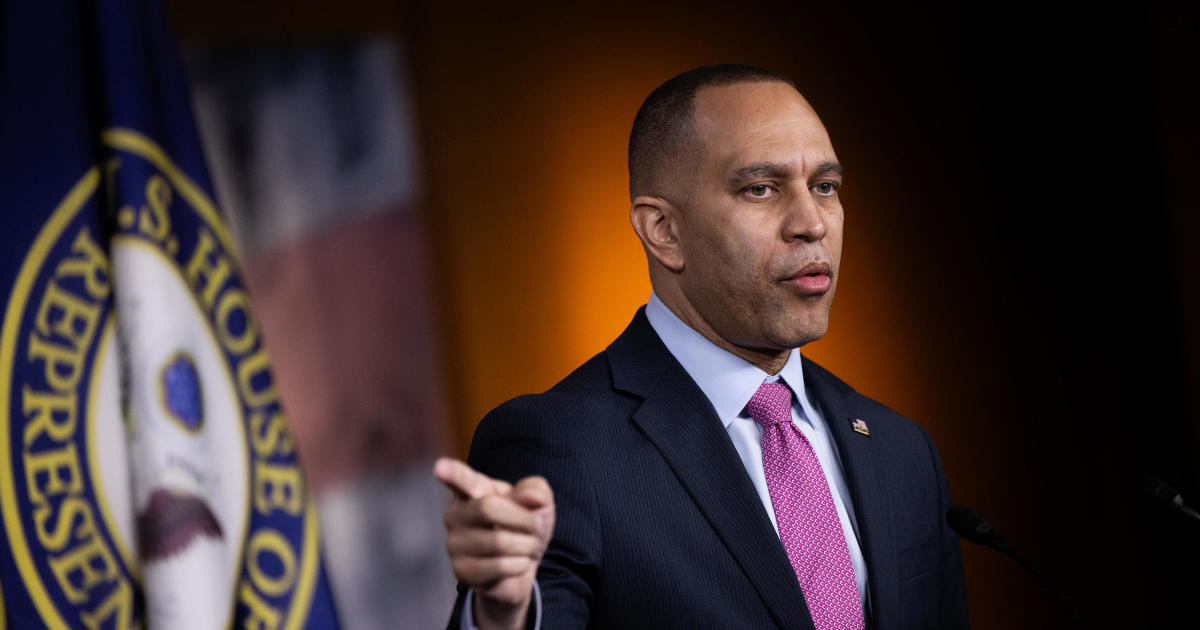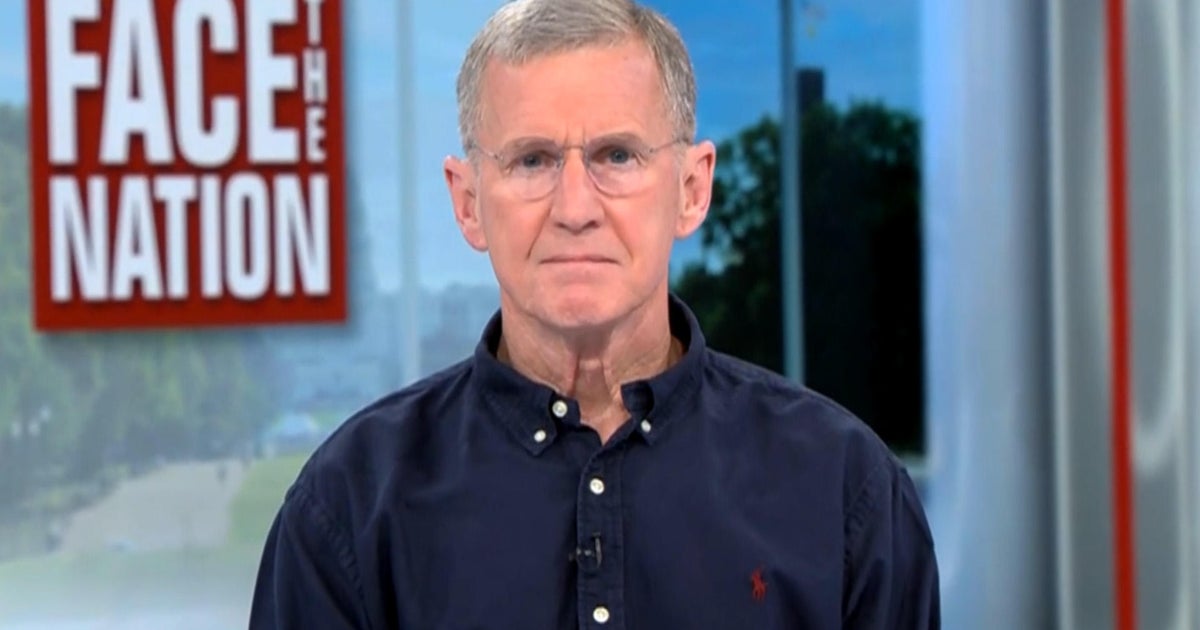CBS News
What is a discharge petition? How House lawmakers could force a vote on the Senate-passed foreign aid bill

Washington — The Senate approved a $95 billion foreign aid package this week, with a bipartisan group of senators backing the bill that includes assistance to Ukraine and Israel. But Republican leaders in the House have been reluctant to commit to bringing the measure to the floor, resisting calls from President Biden and Democratic leaders.
Accordingly, House Democrats are considering “every available legislative tool” to move the legislation forward in the chamber, House Minority Leader Hakeem Jeffries said after the Senate vote.
One option to do so involves a rarely successful legislative maneuver that allows a majority of members to bring a bill to the floor, a move known as a discharge petition.
What is a discharge petition, and how does it work?
Julia Nikhinson/Bloomberg via Getty Images
In the House, the speaker typically works with leaders to set the agenda and decides which bills or resolutions will or won’t get a vote. Most legislation originates in committees, which then vote to send bills to the floor for final approval.
But lawmakers can “discharge” legislation that’s been sitting in committee if 218 members, a majority of the lower chamber, sign a petition to do so, effectively bypassing the speaker to bring a bill before the full House for a vote.
“Discharge is generally the only procedure by which Members can secure consideration of a measure without cooperation from the committee of referral, or the majority party leadership and the Committee on Rules,” a Congressional Research Service report from 2023 said. “For this reason, discharge is designed to be difficult to accomplish and has rarely been used successfully.”
A House rule dating back to 1931 outlines the process. Any member can file a discharge petition with the House clerk, who then makes it available in a “convenient place” for members to sign.
A waiting period of seven legislative days kicks off once the petition gains the signatures of a majority of the chamber. After that, a member who has signed the petition can notify leadership that they’ll bring the discharge motion on the floor.
The speaker must then designate a time for the motion to be considered within two legislative days. If a majority approves it, the House then moves to consider the underlying measure.
Discharge petitions are rarely successful, since a petition brought by the minority party requires members of the majority to buck their party leaders. In recent years, members have tried to use discharge petitions to raise the debt ceiling, increase the federal minimum wage and address other issues. In 2015, several dozen House Republicans bucked party leaders to join with Democrats, who were in the minority, to reauthorize the Export-Import Bank. Before that, a discharge petition hadn’t succeeded since 2002.
The waiting periods, and the fact that garnering enough signatures can take weeks, often renders the maneuver futile for time-sensitive legislation. And a discharge petition can only be brought to the floor on specific days, further complicating its use.
House Democrats already have one broadly worded discharge petition that has the support of 212 active members, and party leaders believe they can use that as a shell or vehicle for bringing the foreign aid bill to the floor. But it would still need sign-on from a handful of House Republicans to reach the 218-member threshold.
Getting members of the majority party to sign on remains the biggest hurdle for a discharge petition, according to Matt Glassman, a senior fellow at the Government Affairs Institute at Georgetown University. While there may be a sizable group of Republicans willing to vote for the bill should it come to the floor, they may not be willing to “make themselves targets” by signing onto a discharge petition.
“If 218 people are hell-bent on doing something in the House, they’re going to get it done,” Glassman says. “You can block them, you can slow them down, but they’re going to win. But nobody’s hell-bent on doing this in the Republican Party.”
Adding to the difficulty is the possibility that some progressives who oppose sending more assistance to Israel could remove their names from the petition.
Jeffries said he was not concerned about losing Democratic support. The minority leader explained that his caucus has been meeting to discuss the “precise steps” that members will take, saying that “all options are on the table.” He added that “it’s clear to me that the overwhelming majority of House Democrats are ready, willing and able to support the national security bill right now.”
“We have a national security bill in front of us that passed the Senate in decisive and bipartisan fashion, and all we need is an up or down vote so we can lift up America’s national security priorities,” Jeffries said.
What’s in the foreign aid package?
The legislation would provide tens of billions of dollars in aid to U.S. allies, including about $60 billion for Ukraine and $14.1 billion for Israel, along with around $9.2 billion for humanitarian assistance in Gaza. On Tuesday morning, after an overnight session, a bipartisan group of senators coalesced around the package, propelling it to passage after months of disagreement about how to move forward.
The legislation notably leaves out enhanced border security measures, after congressional Republicans last week rejected a bipartisan border agreement negotiated in the Senate that former President Donald Trump opposed. But House Republican leaders have nonetheless fiercely criticized the foreign aid bill for failing to address the U.S.-Mexico border.
House Speaker Mike Johnson released a statement hours before the Senate approved the foreign aid bill casting doubt on whether the bill would get a vote in the lower chamber, saying that “in the absence of having received any single border policy change from the Senate, the House will have to continue to work its own will on these important matters.”
The Louisiana Republican added during a news conference on Wednesday that “the Republican-led House will not be jammed or forced into passing a foreign aid bill that was opposed by most Republican senators, and does nothing to secure our own border.”
CBS News
Cousin of slain Hezbollah leader Hassan Nasrallah emerging as his replacement

Watch CBS News
Be the first to know
Get browser notifications for breaking news, live events, and exclusive reporting.
CBS News
Stanley McChrystal says he is backing Harris because “character is very important”

Watch CBS News
Be the first to know
Get browser notifications for breaking news, live events, and exclusive reporting.
CBS News
Austria’s far-right Freedom Party heading for its first national election win

Austria’s far-right Freedom Party was headed for its first win in a national parliamentary election on Sunday, finishing ahead of the governing conservatives after tapping into voters’ anxieties about immigration, inflation, Ukraine and other concerns, a projection showed. But its chances of governing were unclear.
A projection for ORF public television, based on counting of more than half the votes, put support for the Freedom Party at 29.2% and Chancellor Karl Nehammer’s Austrian People’s Party at 26.3%. The center-left Social Democrats were in third place with 20.5%.
Herbert Kickl, a former interior minister and longtime campaign strategist who has led the Freedom Party since 2021, wants to become Austria’s new chancellor on the back of the first far-right national election win in post-World War II Austria.
But to become Austria’s new leader, he would need a coalition partner to command a majority in the lower house of parliament — and rivals have said they won’t work with Kickl in government.
The far-right has tapped into voter frustration over high inflation, the war in Ukraine and the COVID pandemic. It has also built on worries about migration.
In its election program, titled “Fortress Austria,” the Freedom Party calls for the “remigration of uninvited foreigners,” for achieving a more “homogeneous” nation by tightly controlling borders and suspending the right to asylum via an emergency law.
CHRISTIAN BRUNA / Getty Images
The Freedom Party also calls for an end to sanctions against Russia, is highly critical of Western military aid to Ukraine and wants to bow out of the European Sky Shield Initiative, a missile defense project launched by Germany. Kickl has criticized “elites” in Brussels and called for some powers to be brought back from the European Union to Austria.
“We don’t need to change our position, because we have always said that we’re ready to lead a government, we’re ready to push forward this change in Austria side by side with the people,” Kickl said in an appearance alongside other party leaders on ORF. “The other parties should ask themselves where they stand on democracy,” he added, arguing that they should “sleep on the result.”
Nehammer said it was “bitter” that his party missed out on first place, but noted that he had brought it back from lower poll ratings. He has often said that he won’t form a coalition with Kickl and said that “what I said before the election, I also say after the election.”
More than 6.3 million people aged 16 and over were eligible to vote for the new parliament in Austria, an EU member that has a policy of military neutrality.
Kickl has achieved a turnaround since Austria’s last parliamentary election in 2019. In June, the Freedom Party narrowly won a nationwide vote for the first time in the European Parliament election, which also brought gains for other European far-right parties. The party is a long-established political force but Sunday’s projected result, if confirmed, would be its best yet in a national parliamentary election — beating the 26.9% it scored in 1999.
In 2019, its support slumped to 16.2% after a scandal brought down a government in which it was the junior coalition partner. Then-vice chancellor and Freedom Party leader Heinz-Christian Strache resigned following the publication of a secretly recorded video in which he appeared to offer favors to a purported Russian investor.
The leader of the Social Democrats, a party that led many of Austria’s post-World War II governments, positioned himself as the polar opposite of Kickl. Andreas Babler ruled out governing with the far right and has labeled Kickl “a threat to democracy.”
While the Freedom Party has recovered, the popularity of Nehammer’s People’s Party, which currently leads a coalition government with the environmentalist Greens as junior partners, declined sharply compared with 2019. The Greens’ support also was projected to drop to just under 9%, and the outgoing coalition appeared to be well short of a majority.
During the election campaign, Nehammer portrayed his party, which has taken a tough line on immigration in recent years, as “the strong center” that would guarantee stability amid multiple crises.
But those crises, ranging from the COVID-19 pandemic to Russia’s invasion of Ukraine and resulting rising energy prices and inflation, also cost it support. The government also angered many Austrians in 2022 with a short-lived coronavirus vaccine mandate, the first in Europe.
But the recent flooding caused by Storm Boris that hit Austria and other countries in Central Europe brought the environment back into the election debate and may have helped Nehammer slightly narrow the gap.
The People’s Party is the far right’s only way into government.
Nehammer has repeatedly excluded joining a government led by Kickl, describing him as a “security risk” for the country, but hasn’t ruled out a coalition with the Freedom Party in and of itself — which would imply Kickl renouncing a position in government.
The likelihood of Kickl agreeing to such a deal if he wins the election is very low, leading political scientist Peter Filzmaier said before the election.
The most probable alternative would be an alliance between the People’s Party and the Social Democrats — with or without the liberal Neos, who took about 9% of the vote.



